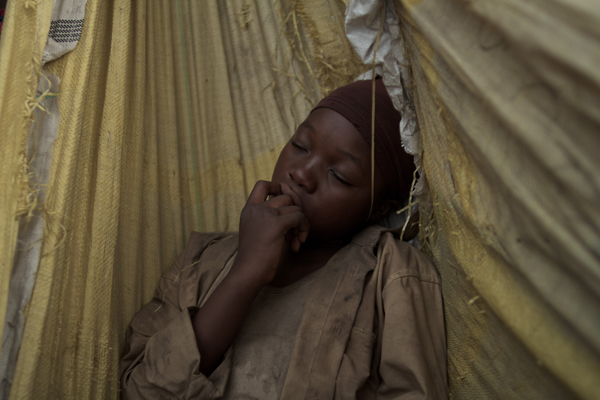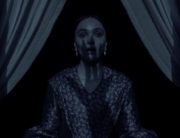
Rachel Mwanza as Komona in WAR WITCH (Tribeca Film)
Imagine a devastated world where starving children are brutally pitted against each other and can only hope to survive through magic. And it’s not the post-apocalyptic future of Mad Max or The Hunger Games. While War Witch is set in a fictional Sub-Saharan African country, the horrors 14-year-old Komona relates to her newborn baby could be happening today in many chaotic places around the world, like in the Republic of the Congo, where Canadian Kim Nguyen directed a mostly nonprofessional but very convincing cast.
As heart-wrenchingly played by Rachel Mwanza (Kinshasa Kids), Komona, at 12 years old, is thrust into a kill-or-be-killed crisis when rebel soldiers invade her village and recruit the children, forcing them to kill their parents. This trauma literally haunts her—images of her mother and father, both painted white, and ghostly victims of more killings follow her. She’s drugged by hallucinogenic “magic milk” from tree sap, and encouraged to kill by watching replays of violent movies. Her survival in one bloody skirmish is considered miraculous proof of her powers as a witch, and she is brought under the protection by a commander, who styles himself the Great Tiger (Mizinga Mwinga). (An incongruous pagoda in his camp was inspired by a report on child soldiers in Burma.)
Even within this macabre reality, Komona bonds with a tall, charming shamanistic albino who calls himself Magician (Serge Kanyinda), proving that hope and love can grow in the most unlikely climate. At 13, she risks all to escape with him for a brief respite (for the audience), including at a guarded albino sanctuary, before they find and live with his uncle, the Butcher (Ralph Prosper). They try to adjust to something of a normal life, including creating a traditional marriage ritual that requires a white rooster. Their misadventures to find and catch the elusive bird would be silly if it wasn’t such a relief to see them act almost like normal teenagers, the irony emphasized by her wearing a stolen Aeropostale T-shirt. Savor this peaceful interlude because Komona’s recaptured, and by 14, she’s being abused in sexual slavery before she finds the strength to take very intimate revenge on a lieutenant so that her unborn child will know freedom and her parents’ spirits will find peace.
For all of Nguyen’s research from around the world, including interviews with ex-child soldiers, it does feel a bit uncomfortable that this heart-of-darkness story is made by an outsider and that it has so many fictional elements, yet international audiences, including a foreign-language film Oscar nominating committee, may interpret it as docudrama. (The narration is in French by Diane Uwamahoro and the atmospheric songs on the soundtrack are from Angola in the 1970s.) But by maintaining Komona’s point of view and giving her resilient strength while under great duress, the film poignantly emphasizes the special travails of girls within these violent societies engaged in constant war (as indicated in the original French title Rebelle). Other films about recovering child soldiers and their victimized cohorts—features such as Ezra (2008) and documentaries like War/Dance (2007)—have mostly focused on the actions and impact on boy soldiers.
















Leave A Comment